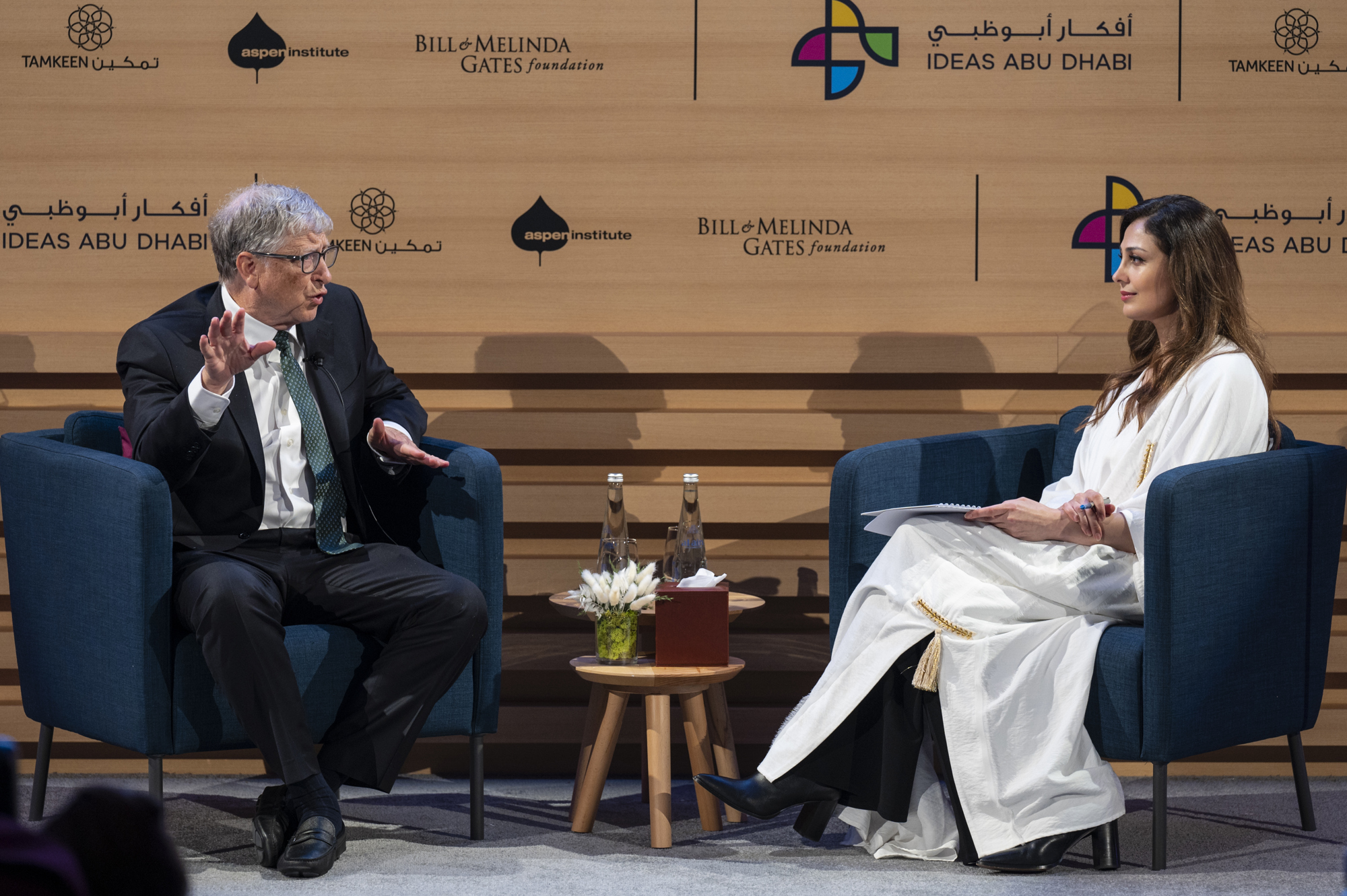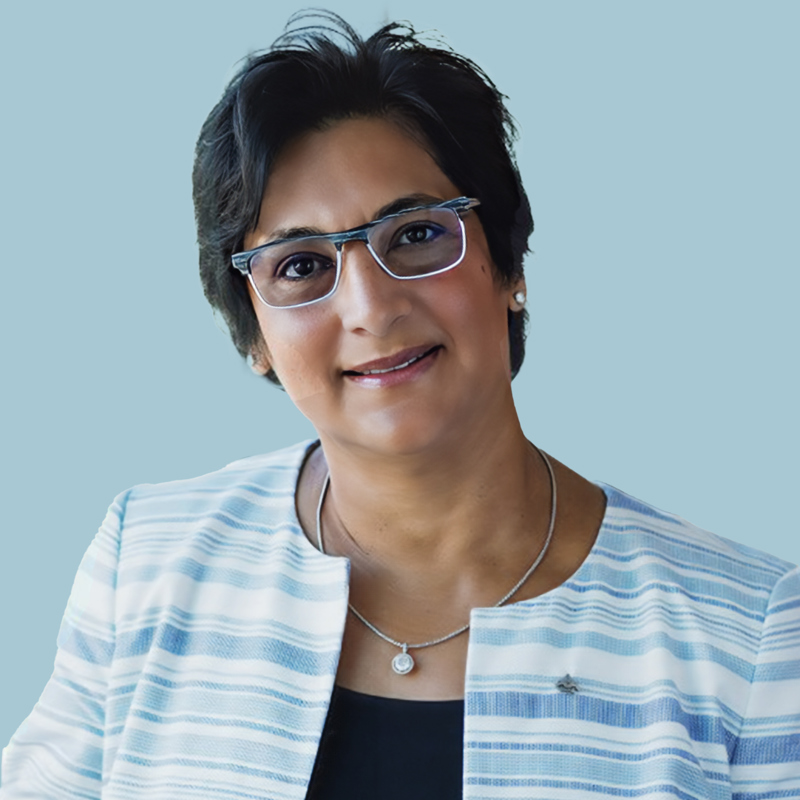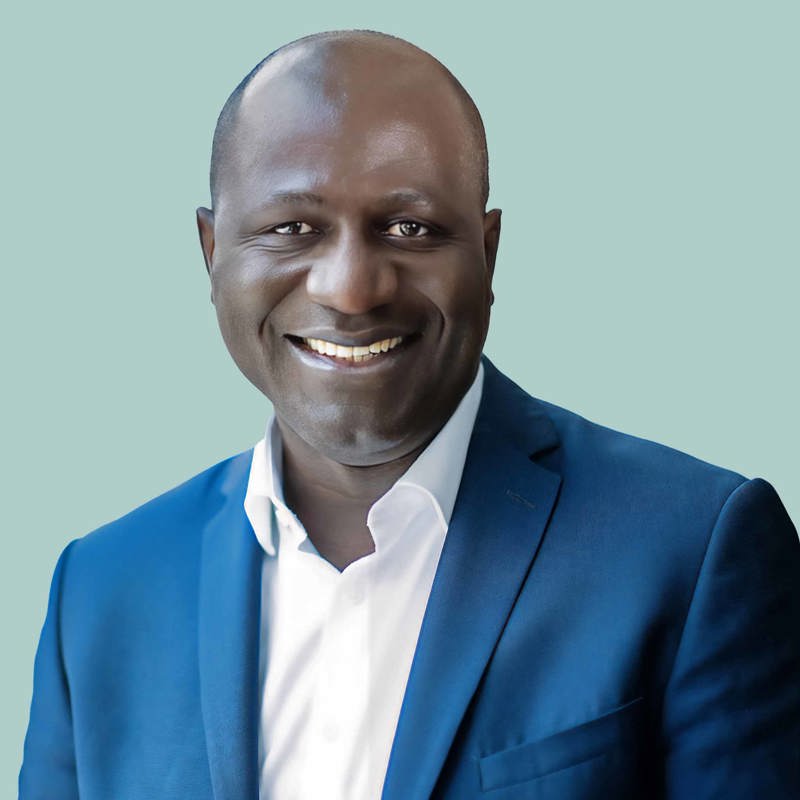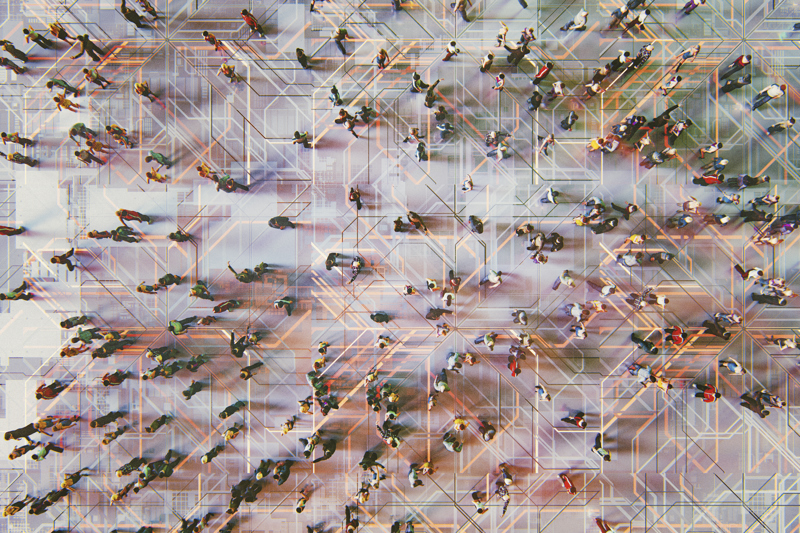A vaccine for HIV, innovation to mitigate the effects of climate change, Artificial Intelligence (AI) to improve teaching, the eradication of malaria and measles — and new medicines to counter obesity and Alzheimer’s. These are just some of the reasons that Bill Gates remains optimistic that, despite current challenges, the world is getting better.
“There are things to be worried about,” he told the invited audience in Abu Dhabi. “US political polarisation is certainly scary to me, the Ukraine war, this economic cycle – although it is a cycle, and it will go back…” But he added: “There's a pipeline of really great things coming… (and) innovation is going faster than ever… It'll be better to be alive 40 years from now than it is today.”
The Microsoft billionaire who co-founded the Bill and Melinda Gates Foundation with his (now ex) wife, Melinda French, was talking with Rima Al Mokarrab, the co-chair of Ideas Abu Dhabi, an initiative of Tamkeen, which organised the half-day summit in the UAE capital in association with the Aspen Institute.
“Around the globe, we collectively face many complex challenges fighting climate change, eradicating disease, alleviating poverty,” noted Al Mokarrab in her opening address ahead of her “fireside chat” with Gates. “These are all shared challenges that don't fit neatly within borders and in some way affect all of us. They're too large for any one actor, governments, private sector, academia, citizens, nonprofits. We all have to work together, and we all have a crucial role to play.”
Other speakers at the event held under the theme of “catalytic philanthropy” included: Salama Al Ameemi, director general of the Authority for Social Contribution—Ma’an; Homaid Al Shimmari, deputy CEO of Abu Dhabi’s sovereign wealth fund, Mubadala; Saudi impact investor Prince Khaled bin Alwaleed bin Talal Al Saud; Zimbabwean philanthropist and social entrepreneur Elizabeth Tanya Masiyiwa; and UAE-based Indian writer, Neha Hiranandani.
Rima: Could you tell us a bit about your philanthropic journey, how it has evolved and what advice you might give for those who are starting their journey?
Bill: I started the foundation when I was 45. I'd been doing some giving and studying giving, but a lot of my time was focused on my work at Microsoft, which created the fortune, and then this incredible opportunity to try to give it back. What made sense for me was not just to write cheques but rather to build an organisation, to take on things like malaria and TB and HIV. It was in my early forties that I saw that this incredible inequity in terms of how life is treated, that children in poor countries are 50 times more likely to die, and that many diseases like malaria get almost no money.
So, I studied several foundations, including the Rockefeller Foundation and the Carnegie Foundation, and then took the model of innovation that came from my private sector work. We built the foundation primarily focused on global health… It was a real paradox to have things like vaccines to protect against diarrhoea, which were being given to rich kids, even though it wasn't that important for them, but not to the kids in low-income countries, where at that time over 600,000 a year were dying from diarrhoea-related illnesses.
We were able to hire in some great people who (had) worked in the field and who (had) came out of the pharmaceutical business. And we've been on the learning curve in terms of partnerships ever since then. Two of the things we did at the start, the founding of GAVI, the Vaccine Alliance, which buys vaccines, and The Global Fund, which focuses on three diseases HIV, malaria, and tuberculosis, have turned out to be great organisations, which we continue to be involved with.
"There are setbacks, but overall the progress of reducing childhood death and cutting it in half since the turn of the century is an amazing movement to be involved with."
Bill Gates, co-chair, Bill & Melinda Gates Foundation
Rima: Your foundation has pioneered the approach of taking big bets in philanthropy and your partnership with His Highness Sheikh Mohammed Bin Zayed, the President of the UAE, has made several multi-million-dollar big bets, particularly in global health and disease eradication. How would you assess the success of these initiatives and that wider approach of making big philanthropic bets to achieve transformative outcomes?
Bill: We've worked with President Mohamed Bin Zayed on a number of things. He has been very generous to GAVI, the vaccine organisation, and that has had phenomenal impact saving lives for very little money. (Vaccines) really help these countries because if you improve health in general, the population growth goes down because you know that most of your children will survive. So, then everything - education, food, and stability - becomes better as we invest in health. So GAVI has been a great partnership.
On neglected diseases… in many cases, we have the drugs, but we just need to raise money to get them out. These (diseases) are mostly in Africa, but with like onchocerciasis (river blindness) we keep adding new countries where they have eradication. To get that globally, it will take us, you know, ten or fifteen years, but every piece counts.
Another big joint effort has been polio eradication. The single biggest programme at the Gates Foundation is polio eradication. It’s an amazing thing: once you get rid of a disease, then you're done, it's over. But only one human disease has been eradicated, which is smallpox, and that was way back in 1981. The polio campaign started in 1988, and at that time, over 300,000 children were either dying or being paralysed every year. We've had a lot of success in getting that down and we've been down to less than a couple hundred for some time. But the last part is very difficult. For example, with the war in Yemen, more kids were paralysed in Yemen than anywhere in the world last year because polio got there - and because of the war conditions, we couldn’t get them the vaccination.
Pakistan and Afghanistan are the two countries where we've never gotten to zero. But we're very hopeful and Abu Dhabi has important relationships that are helping us achieve that, as well as the resources that go into that eradication campaign. Eradicating a disease is a big thing. The Covid epidemic set us back about three or four years, but we think we're back on track to get that done. Once we get polio, you know, then we'll take on malaria and measles, which are the next two diseases that we should be able to eradicate in time.
My foundation work is super interesting: inventing new tools, raising money, figuring out how to work in these communities. There are setbacks, but overall, you know, the progress of reducing childhood death and cutting it in half since the turn of the century is an amazing movement to be involved with.
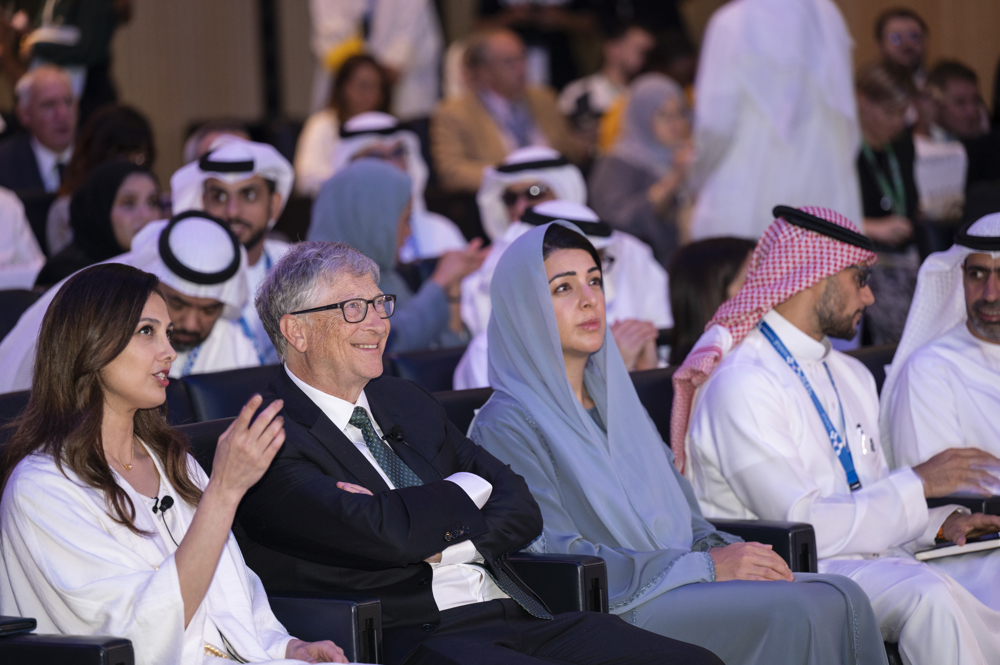
A high level audience from government and regional foundations attended the event at NYUAD.
Rima: How much patience should philanthropists show when they're pursuing a particular objective or tactic? And when do you have to just cut your losses and move on to an alternative approach?
Bill: A good example of patience is when the foundation first got going in the year 2000, we made discovering an HIV vaccine one of our top priorities. We still hope that in maybe in ten - or at most fifteen - years we'll have an HIV vaccine. Our foundation has funded the creation of 20 new vaccines, but sadly, the HIV vaccine is not one of those. It turns out that because HIV is a disease of the immune system, it's kind of complicated, since the immune system is what is damaged, and you have to vaccine against that. Here we are 23 years and about a billion and a half dollars later and the most promising work we're doing is still fairly early stage. We haven't given up though, we're still very hopeful.
One of most promising approaches is something that we funded starting back in 2003, which is using an mRNA type of vaccine to go after HIV. That's done in partnership with German company BioNtech, which created the Pfizer BioNtech Covid vaccine that was extremely successful. So, you know, it's a new technique that provides promise.
Polio has been hard, and we certainly ask ourselves many times: should we keep going? But if we stop, it'll spread back and you'll have several hundred thousand kids a year being paralysed, so it would be kind of tragic to have to give up. You know, recently with the Ukraine war, we've had some donors who have cut their overall aid budgets. That's tough (and) until that war is over, things are going to be a little bit extra tough because Europe is prioritising so many things like defence budgets, refugees, and electricity, and overall, aid budgets are going down. Eventually they will go back up, but with polio, we're having to step up to be an even higher percentage of that polio campaign than we expected. But we're stubborn and we understand what it takes. If it hadn't been for Covid, I think we'd be done by now. Eradications aren't something to do lightly because your last few countries include Somalia, Yemen, the northeast of Nigeria, and of course Afghanistan, and the hard parts of Pakistan. So, realistically, it can be done with partnerships, including the one we have here (in the UAE).
"If I had one wand, I'd wave it and get rid of malnutrition - even before HIV and malaria."
Bill Gates, co-chair, Bill & Melinda Gates Foundation
Rima: So if I could turn to the region, where we have an incredible tradition of smaller-sized individual giving. It's embodied by the Zakat tradition in Islam and through other acts of individual generosity. What advice can you give individuals as they seek to maximise their impact for giving?
Bill: In any country, you are going to have causes such as diseases, handicapped children, after-school programmes, you know, a wide variety of things. That's nice in a way because you can get involved and see the results. Also, for many young philanthropists, it's not that they're going to give money - although it's nice to get in that habit, even if starting in a very small way – they're going to give their time, they're going to volunteer, so they'll go and see what's going on.
The percentage of philanthropy that goes from well-off countries to poor countries is actually quite small. It's about 5 percent. You know, I personally think it should be more, like 20 percent, because you're saving lives for less than $1,000 per life saved. Our foundation gives about 6 percent In the United States and 94 percent goes to the poorest countries. We're kind of an extreme case, but because of our scale, we're able to do that.
Everyone's philanthropic journey is different. Nobody gives their philanthropy dollars just purely based on logic. It's very much a connection to other humans and it's driven by caring. Part of the beauty in philanthropy is the variety. It's great when people have common causes that they work together on health or education or climate. But, for each person, they'll have to pick up the mix of things that really connect to them emotionally.
Rima: Through your philanthropic career, you've developed high impact partnerships, including with governments to create GAVI, the Vaccine global Alliance, and CEPI for epidemic preparedness. Can you speak a little bit how partnership has been a key mechanism to multiply the impact of the foundation and how we should be thinking about partnerships going forward?
Bill: Well, some of these problems are gigantic and even our giving isn't enough. Some things like (research for) a cholera vaccine or a typhoid vaccine, we can afford to fund that ourselves. But when it comes to funding it every year, getting it out to the kids who need it, then we turn to somebody like GAVI. Another goal we've had for our foundation is to facilitate philanthropists meeting each other, even in areas where we don't work. For example, a lot of people care about the oceans, and so under our Giving Pledge umbrella, philanthropists find each other, talk to each other, and collaborate. That's an absolutely amazing thing.
On neglected diseases, we created a thing called the End Fund, so when a family wants to give even a million dollars, we can say, okay, that money is going to this country… There are large partnerships, there are small partnerships. We're trying to make it easy with tools like Co-Impact or the End Fund where very experienced philanthropists are involved to make sure that it's very streamlined and highly impactful, and that it is being measured in the right way.
Rima: Can you talk about the role that data plays in maximising the impact of your giving and how do you operate in areas where there might not be so much data available?
Bill: So in the year 2000, the field of global health was pretty immature. We kind of knew that about 11 million kids were dying every year, but we really didn't know what they were dying of. We had broad categories like diarrhoea, pneumonia, malaria, and first 30 days, which are the primary areas. But in terms of understanding whether that was down to bacteria, or a virus, and how did it vary, we didn’t have much understanding. I remember going to an early meeting and I asked about autopsies to see what children had died of. People laughed because in poor countries, you know, getting permission to do something like that wouldn't happen as the costs and skills wouldn't be there. So now we have created a programme where in many countries, we go to parents and say: “Hey, would you be willing to have us do just a few samples – in a way that there's no disfigurement involved – so we can help other children not die?” We've had a 90 percent acceptance rate so now we're finally understanding what is going on and the cause of deaths and with philanthropy, you can measure your impact and the lives that are saved.
Another big area for us right now is malnutrition: over a third of the children in sub-Saharan Africa never develop their body or their brain. They are an average of three inches shorter and their average IQ means they can never really learn to read or write. This is the greatest loss of human potential now, even worse than the deaths, which are still about 5 million a year. We have a plan to get that down and to cut that in half again. The greatest tragedy are these kids who never fully develop. We've gained some insights into what that is: it's not a shortage of food, that's rarely the case, only about 10 percent of malnutrition is where you have acute famine. Rather, it’s due to a condition where children’s’ guts are inflamed and they can't absorb the nutrition. If I had one wand, I'd wave it and get rid of malnutrition - even before HIV and malaria and all these other things.
"The main thing to do is to get engaged, whether it's in a local cause or a global cause."
Bill Gates, co-chair, Bill & Melinda Gates Foundation
With education, we are at a much earlier stage in terms of understanding where our money can really make a big difference, but we’re starting to benefit from some of the lessons that have come out of health. Climate adaptation is also very immature, even now that some intellectual analytical power is going into that. We must take these very scarce grant dollars and make sure that it's well spent because if we don't, people become cynical and want to know what we are doing… We should be as good as the private sector, you could say even more, because we have such scarce dollars to solve these gigantic problems.
Rima: We have people here in this room from across all sectors of the philanthropic ecosystem, the government, private sectors, and NGOs. What's the best way that those individual sectors could be most helpful to your philanthropic efforts?
Bill: The main thing to do is to get engaged, whether it's in a local cause or a global cause. It is understanding that leads to the moral sense of, hey, we should be doing more of this, and here's how we should be doing it. In your twenties, you’re usually focussed on your career, but hopefully you have some moral cause that you also want to develop expertise on. Sometimes that could be connected to your profession. Certainly, if you work in health, or technology, or finance, all those are areas where we need to do more in the developing countries.
People also have their voice to speak out about causes. As a consumer, (you) can buy from companies that are engaged and doing great work. We're starting to see that with climate, not just related to cars, but also to food, almost everything. There are companies who need the positive feedback because they're putting resources into how they change things and as a consumer, you can show that you want to push that forward. The big stuff will come as we get young people working on the science of these things.
A young person can pick one or two causes to be an expert (on) and get involved. Maybe pick one that's domestic and one that's international, and then get a group of friends together to take a trip out to see those things, volunteer time to help out. Then, by the time you get into your forties and fifties, maybe your contribution will be more in a financial nature. But even if it never goes in that direction, we're shorter of engagement than we are funding. We're very short of money, but engagement is, I'd say, where we need the most to increase.
Rima: Can you share your thinking on how you are tackling climate change through philanthropy?
Bill: The big victims of climate change are poor farmers who live near the equator because temperatures are getting to a level where they won't be able to work outdoors in the summer and the crops that we typically have simply can't deal with the heat. As the temperature goes up, you have more rain, and it tends to come in big bursts, causing floods and droughts. That variance of rain availability is very problematic… but amazingly, we can create crops that need a lot less water and which are more than twice as productive as the crops we have today. Sorghum does very well at high temperatures, for example. Maize can be adapted to go up to higher temperatures, as can rice. For livestock, there are ways to breed so you can get chickens and cows and goats that are able to withstand temperature and be far more productive.
Climate change is a great injustice because it was caused by mostly temperate zone countries, yet the big impacts between now and the end of the century, are all in these poor countries near the equator, particularly around the Sahel, which also has very high population growth and political instability.
Rima: During Covid-19, you played quite a central role in pandemic response through your philanthropic work. Can I ask you to reflect on what you learnt through this journey, what philanthropy has contributed, and how to protect against future pandemics?
Bill: The pandemic in a certain sense was predictable. There are basically five families of respiratory viruses, and we should be monitoring on an ongoing basis exactly what's going on. The world response in some ways was good; there was some generosity before the pandemic to a group called CEPI, which was doing the research. Then after the pandemic got going, there was philanthropy for COVAX, which was trying to buy the vaccines. In a way we were lucky that because this was a disease of old people, so the developing countries didn't suffer as much because of their age structure and because if you worked outdoors, your risk of getting infected was dramatically reduced. Even so, we didn't do a great job getting the vaccines out, so now we’re understanding how we'll do that differently.
There are some wonderful things that I think will come out as we get our act together. One is this thing where we look in sewage, which is otherwise called environmental surveillance. Historically, this has been used by the polio campaign, and it's used to detect cholera and typhoid and it turns out it works perfectly well for all respiratory diseases and the best Covid tracking was done using that technique. And now we're going to use that technique worldwide and be able to see disease outbreaks very rapidly. It's not going to be that expensive to build this surveillance network and we'll figure out how to make diagnostics very rapid and very accurate.
People talk about vaccines, but you only need vaccines if something goes global. Instead, you want to invest in never letting things go global, although you want to have the vaccines as a backup in case it escapes out to very large numbers. I hope over the next three to four years, we will strengthen global surveillance and invent these new products like vaccines so you take them once and you're protected forever, and they can protect you from infection, which today's vaccines don't.
There is a lot of excitement in the R&D path and a little bit of progress in thinking about the global architecture. The private sector is not incentivised to deal with disaster, that's really the role of governments. On a global basis, that means the World Health Organisation, and it means having a dedicated team of people who are watching and getting people ready so that it's very different next time.
“There's a pipeline of really great things coming… (and) innovation is going faster than ever… It'll be better to be alive 40 years from now than it is today.”
Rima: So how many of these lessons that you just mentioned do you think have landed? Do you have any indication at this point that next time we're going to do that better?
Bill: This pandemic has had, at this point, about 20 million excess deaths, as in people who would be alive today if it hadn't been for the pandemic. The last time the world had something of that scale was World War II and then we actually got pretty serious creating institutions, including the United Nations, World Health Organisation, and all the Bretton Woods agencies. So that was a huge thing. That's not happening this time, a little bit because of US polarisation, a little bit because of the Ukraine war, but there are some great debates happening about diagnostics and surveillance.
Rima: Can you tell us why you are so optimistic despite all the doom and gloom?
Bill: Two hundred years ago, the average lifespan was 30 and 95% of people never learned to read. In 1960, the vast majority of the world population lived in poor countries. Today, the vast majority live in middle-income countries… Our understanding of disease is moving very, very rapidly. Even though it's taking a long time, we will have a vaccine for HIV, and we will have an HIV cure. Even in areas like obesity, which is a rich world thing that our foundation is not involved with, there are a few tools that have come out recently that are very promising, and that's just the beginning of a pipeline. With Alzheimer's, for example, we're finally starting to see a little bit of benefit. There's a pipeline of really great things coming…
Human ingenuity is incredible. Yes, there are things to be worried about: US political polarisation is certainly scary to me; the Ukraine war; this economic cycle, although that is a cycle and it'll go back… (but) innovation is going faster than ever. It's great that people worry about problems because we don't want to be completely blithe and ignore them. We do want to engage our youthful IQ in things like climate mitigation and climate adaptation. But, you know, I can say for sure there's more innovation helping us with these roles than ever in history and it'll be better to be alive 20 years from now, 40 years from now, by a lot than it is today.
Rima: Can you name someone who's inspired you on your philanthropic journey?
Bill: I think we all benefit from our parents setting an example. You know, their time and the moral basis of all this work. Warren Buffet might be on that list along with my parents. Almost half the resources of the Gates Foundation have come from Warren Buffett. And he you know, he's delegated that to me… so that's a huge responsibility. So, Warren's pretty good. Some of the big philanthropists of the past, like Rockefellers, were surprisingly good. There's a lot to be learnt from them.
Rima: Final question, you love to play the game Wordle. What's your opening word?
Bill: There's a lot of debate about this. There are words, like radio with three vowels or audio and adieu with four vowels. I switch it around from time to time, really doing it to get the vowels done. I waste time on those word games. Not much, but it's a fun daily pastime.
This is a transcript of Bill Gates in conversation with Rima Al Mokarrab at the Ideas Abu Dhabi Catalytic Philanthropy event held at NYUAD in December 2022. It has been edited for length and clarity.
